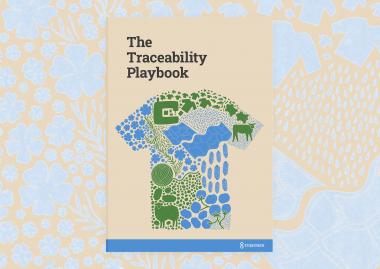Transparente Mode: I:CO beteiligt sich am Traceability Playbook
SOEX Tochtergesellschaft I:CO wirkte an der Erstellung eines Handbuchs mit, das dabei helfen soll, die Rückverfolgung von Produkten und Materialien innerhalb der Modebranche zu vereinfachen. Unter dem Namen „Traceability Playbook“ veröffentlichte das Team von TrusTrace in Zusammenarbeit mit Fashion for Good und Fashion Revolution eine Anleitung, wie Unternehmen einen Überblick über die Herkunft, Bewegung und Entwicklung von Produkten und Materialien bekommen und kommunizieren können. I:CO legte dafür Informationen über seine Zusammenarbeit mit den großen Marken Mango und H&M offen.
Damit Transparenz Realität wird – sowohl intern als auch extern – streben immer mehr Marken eine Rückverfolgung ihrer gesamten Lieferketten an. Umso mehr Bestandteile und Materialien Teil der Wertschöpfungskette sind, desto komplexer wird die Umsetzung. Das gilt insbesondere für die Modebranche, in der Marken, Hersteller und Lieferanten oft über mehrere Kontinente verteilt sind. Um eine Rückverfolgung möglich zu machen, braucht es eine engere Zusammenarbeit innerhalb der Branche, Automatisierung und datengesteuerte Systeme, das liefert das Traceability Playbook.
Der Leitfaden bietet daher sowohl aktuelle Einblicke als auch Beispiele für bewährte Verfahren und Fachwissen von Vordenkern der Branche. Um aufzuschlüsseln, wie die Sortierung von getragener Kleidung zur Wiederverwendung und Wiederverwertung optimal gestaltet werden kann, gewährte I:CO Einblick in die Zusammenarbeit mit Marken wie H&M und Mango und in die Geschäftspraktiken als Dienstleister im Bereich Sortierung und Recycling.
Das Traceability Playbook wurde erstellt, um den nachhaltigen Wandel in der Modeindustrie voranzutreiben und ist ein vollständiger Leitfaden für die Rückverfolgbarkeit der Lieferkette. Es wurde von TrusTrace in Zusammenarbeit mit Fashion Revolution und Fashion for Good verfasst und stützt sich auf die Expertise von Vordenkern der Branche. Als offene Ressource ist das Handbuch kostenlos und für jeden zugänglich, der mehr über die Rückverfolgbarkeit erfahren möchte und darüber, wie sie genutzt werden kann.
Das Handbuch ist ein Plädoyer für Transparenz und Rückverfolgung auf Produkt- und Materialebene. Denn der Druck auf die Unternehmen wächst, allein durch die politischen Vorstöße für ein europäisches Lieferkettengesetz hat die Rückverfolgung von der Herstellung bis zur Entsorgung deutlich an Wichtigkeit gewonnen. Das Lieferkettengesetz soll EU-Firmen dazu verpflichten, ihre Zulieferer entlang der gesamten globalen Lieferkette zu überprüfen, inklusive aller direkter und indirekter Geschäftsbeziehungen.
SOEX










